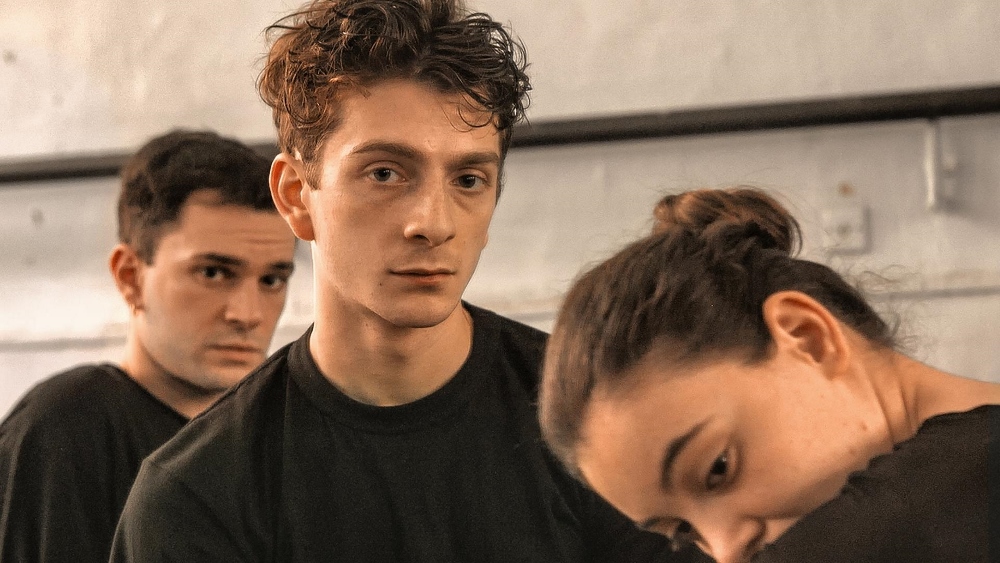
Love, dance and love of dance are the heart of Swedish born director Levan Akin’s third feature And Then We Danced, his first to explore his Georgian roots. Levan Gelbakhiani is mesmerizing as Merab, a young dancer in the Georgian National Ensemble who experiences love for the first time. Sensitive, nuanced and exhilarating, it’s a stirring, memorable performance that heralds this young actor as a great talent.
Merab is first seen in rehearsal, practicing a duet with his longtime partner Mary (Ana Javakishvili). Smiling with youthful bravado, joy emanates from every cell in his body, energetic and spirited. Then their teacher Aliko (Kakha Gogidze) stops them in mid-dance, criticizing Merab for being “too soft” in his gestures, saying: “You should be like a nail.” According to Aliko, who represents the prevailing culture, Georgian dance is about masculinity. As for Mary, her gaze is deemed too playful by Aliko, who informs them and the ensemble that “there is no sex in Georgian dance.”
Merab is a dedicated and ambitious dancer, his brother David (Giorgi Tsereteli), who is also a member of the youth ensemble, not so much. The brothers live with their mother and grandmother. It’s a warm, loving, home but money is hard to come by and Merab works nights at a restaurant to help out. David spends his nights in other occupations, often coming home at dawn. Dance is a family tradition, Merab’s parents and grandparents were all dancers in the Georgian National Ensemble. Yet the rewards of dance are fleeting at best: although Merab’s parents both performed at the Albert Hall, these days, his mother can’t afford the electric bill, and his father (who does not live with the family) has a stall in the marketplace.
The handsome and talented Irakli (Bachi Valishvili) joins the troupe just as it is announced that the main ensemble will be holding auditions for a male dancer. Merab can’t take his eyes off him. Irakli is a formidable rival, and an attractive one. Yet they live in a culture in which pursuing a relationship would make them social outcasts, and even put them at risk. After rehearsal, the girl’s locker room is all a-buzz about Zaza, a dancer who was caught having sex with another man, and immediately expelled from the company.
Director Akin has stated that the catalyst for making this film was the May 17 (International Day Against Homophobia) Gay Pride parade held in Tbilisi in 2013, when the marchers were attacked by a mob. Making this film in Georgia was a courageous endeavor for all those involved, given prevailing homophobic attitudes, participating in such a film they risk social censure, and perhaps even bodily harm. At the Jerusalem Film Festival screening, in a Q & A with the film’s producer Ketie Danelia and Levan Gelbakhiani, moderated by Artistic Director Elad Samorzik, Danelia stated that they shot the film in a “hideout” in order to ensure the safety of the actors. The film’s credits testify to this harsh reality, with the Georgian choreographer for the film listed as “anonymous”. Levan Gelbakhiani stated that despite his initial concerns, ultimately, for him, the film was a chance to “be a part of social change.”
The dance scenes are sheer delight, whether rehearsals of traditional Georgian dance in the studio (accompanied by wonderful music), impromptu bursts of youthful energy, or the beat-driven trance of a late-night club scene. Gelbakhiani is a breathtaking dancer, his movements eloquent and exuberant. One of the film’s most striking scenes is when Merab dances for Irakli to Swedish singer Robyn’s Honey, donning a traditional sheep’s wool hat, imbuing every movement with pleasure and pride.
Although the film does lean on some familiar tropes, such as Mary’s limiting role as the ‘best friend in love with the protagonist who remains loyal despite her disappointment’ (films such as Love, Simon come to mind), and certain aspects of the dance plot, much of its strength lies in small, carefully observed moments. As a tired Merab clears off tables, a little girl sits and watches, and he smiles, radiating the warmth of a kind heart. When Aliko decides to cast Irakli in a duet with Mary, replacing Merab, his morose look, biting his nails, lost in thought, could elicit empathy even from the most indifferent observer. On another day, riding the crowded bus early in the morning to rehearsal, Merab is flanked by Irakli and a stranger. The woman and Irakli sleep soundly, resting their heads on Merab’s shoulders, and his smile reflects the hesitant, hopeful joy of one who loves.
As a dance film, And Then We Danced reflects the beauty of Georgian music and dance, and the potential of innovation merged with tradition, as expressed in Merab’s thrilling dance sequences, coming to a triumphant crescendo in the final scene. Yet ultimately, it is a film about love, the different kinds of love we share – with family, friends, and lovers. There is a visually striking scene that in one fluid shot articulates Merab’s isolation as he walks alone through a party. Later, at home, he shares a tender, pivotal moment with his brother David, a reminder that people we think we know well may yet surprise us with their understanding and generosity of heart.
And Then We Danced
Sweden, Georgia, France 2019/103 minutes/Georgian with Hebrew and English subtitles
Written and directed by Levan Akin; Cinematography: Lisabi Fridell; Editors: Levan Akin, Simon Carlgren; Music: Zviad Mgebry, Ben Wheeler; Cast: Levan Gelbakhiani, Bachi Valishvili, Ana Javakishvili, Giorgi Tsereteli, Kakha Gogidze, Tamar Bukhnikashvili, Ana Makharadze, Levan Gabrava, Marika Gogichaishvili, Aleko Begalishvili, Ninutsa Gabisonia. (Georgian dialogue)





